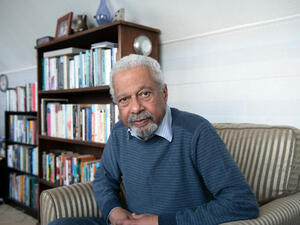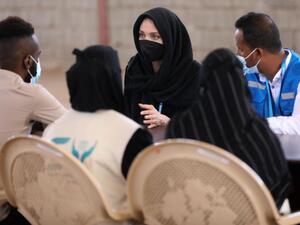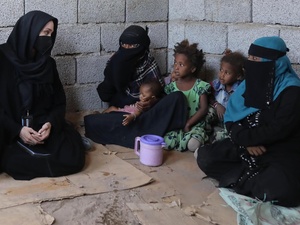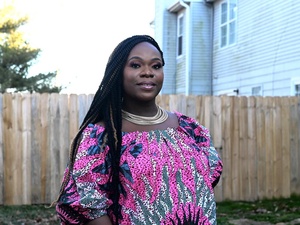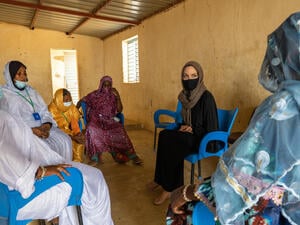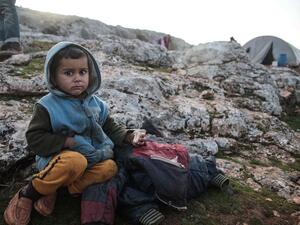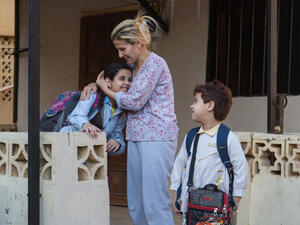Jolie highlights the continuing suffering of the displaced in Bosnia
Jolie highlights the continuing suffering of the displaced in Bosnia

These two sisters, Lena and Mara, told UNHCR Goodwill Ambassador Angelina Jolie about their Easter traditions when she visited them in the Bosnian town of Rogatica.
SARAJEVO, Bosnia and Herzegovina, April 6 (UNHCR) - UNHCR Goodwill Ambassador Angelina Jolie has called for steps to end the continuing suffering of displaced victims of the Bosnian War after hearing their harrowing tales and seeing their grim living conditions during a brief visit this week.
Jolie, travelling with her partner Brad Pitt, on Monday took a break from filming to visit Bosnia and Herzegovina and highlight the plight of 113,000 Bosnians and 7,000 refugees from Croatia. These people were forced from their homes during the violent break-up of the former Yugoslavia in the 1990s and many of them are living in collective centres, often in appalling conditions.
The acclaimed actress was clearly moved by the spirit - and the suffering - of the people she met and she pledged to highlight their case. Most of the people she talked to have been living far from home for well over a decade. Many of their children were born in exile and have never seen where their families come from.
Jolie kicked off her first trip to Bosnia and Herzegovina by visiting a crumbling and dilapidated collective centre in the eastern town of Gorazde, which lies on the Drina River and was a UN-protected enclave throughout the 1992-1995 war. She and Pitt visited another collective centre housing displaced people in Rogatica, where the inhabitants told the couple about the daily hardships they endure, including a lack of basic services such as running water.
"After seeing these people and hearing their stories, I cannot overemphasize the need to focus on the well-being of the most vulnerable individuals of the population," Jolie said, adding that by "ending displacement and ensuring quality of life, we can help to promote progress and long-term stability."
Among these "most vulnerable individuals" were a group of internally displaced women who suffered very bad experiences during the war. While Pitt went off to speak to their menfolk, Jolie spent some private time with the women.
After the meeting, an emotional Jolie said they had told her about the ordeal they had suffered during the war, including rape and torture. "I have my body, but it no longer has a soul," one woman told her.
Jolie also met a family who had returned to their home village near the eastern Bosnian town of Visegrad and were trying to rebuild their lives with help from the UN refugee agency and local authorities. The area saw some of the worst atrocities of the war.
Their house has been reconstructed, but it still lacks running water, electricity and other essential infrastructure. So the parents and their four young children have had to bunk up in a house owned by relatives in a village three kilometres away.
The mother, Maja,* was taken aback when she recognized their celebrity guests and invited them into their humble home. When she had recovered her composure, she told Jolie and Pitt about the challenges they face.
But while Jolie was saddened by many of the things she heard, the Goodwill Ambassador said she was "so inspired by these families. Despite the grim realities of their unsettled existence, they have an incredible determination to make a better future for their children."
And she promised to help spread awareness about their forgotten and protracted situation. Jolie said she hoped "to return to this beautiful country soon and meet with political representatives to further discuss the solutions that are so badly required."
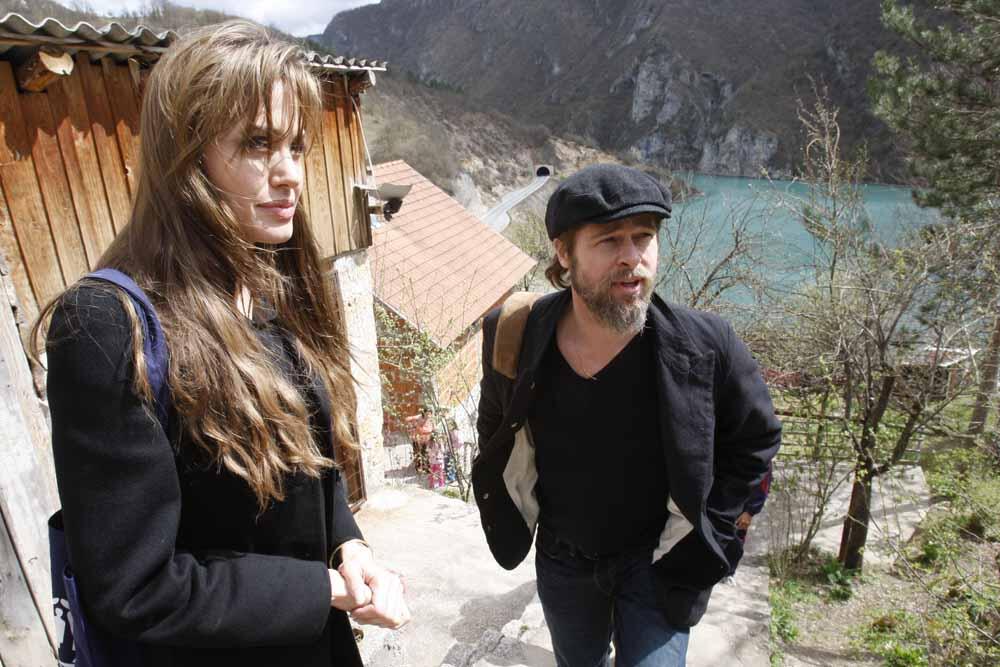
UNHCR Goodwill Ambassador Angelina Jolie and her partner Brad Pitt visit refugees near the eastern Bosnian town of Visegrad.
Looking to the future, she noted that "Bosnia and Herzegovina now has the opportunity to move forward by ending displacement and further capitalizing on the EU [European Union] accession process. The local leadership has the ultimate responsibility to make choices to ensure that this will happen."
The conflict in Bosnia and Herzegovina forced more than 2.2 million people to flee their homes, making it the largest displacement of people in Europe since the end of World War II. The suffering continues to this day for many.
To date, more than 1 million people have returned home across Bosnia, with UNHCR playing a major role in the return, reconstruction and reintegration process. For those who remain displaced, many are elderly or ill and barely able to look after themselves. They have specific needs, including institutional care such as social housing, geriatric and mental health institutions or hospitals.
* Name changed for protection reasons
By Scott Pohl and Naveed Hussain in Sarajevo, Bosnia and Herzegovina


